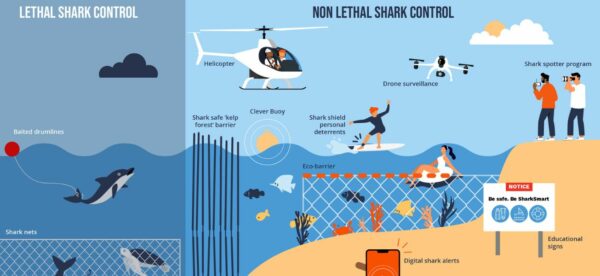This non-lethal technology is being used to identify sharks on five beaches in southern Queensland, the Sunshine Coast, Gold Coast and North Stradbroke Island. The trials are due to run until November, but may be extended into summer and to additional beaches.
Shark spotter drones are a welcome change from the lethal shark mitigation strategies currently in Queensland’s waters. Shark nets and drumlines are designed to catch and kill anything that swims into them, and thousands of innocent marine animals die as a result each year.
Three humpback whales were entangled in as many on the Gold Coast this June. They were left struggling for their lives for hours – it’s only a matter of time until one of these entanglements is fatal.
Drones are increasingly used for a range of ‘eco-services’ including anti-poaching, quantifying habitat change, and preventing human-wildlife conflict. From counting dugongs to collecting whale snot, they’ve been used extensively in the marine environment and have proven to be an extremely effective monitoring tool.


Credit: Action for Dolphins
Aerial shark surveillance is nothing new. Australia started one of the earliest ‘shark patrols’ in the form of the Australian Aerial Patrol in Illawarra in 1957. And thousands of kilometres of beach are still patrolled from the sky by aeroplanes and helicopters on any given weekend.
Drones are a step up from traditional aerial surveillance as they can be used in tandem with machine learning software to boost shark detection rates and species identification. If shark spotter drones are also combined with smart technology (such as smart watches) they can even be used to send personalised alerts straight to people’s fingertips.
AFD has been advocating for non-lethal alternatives for years, and research carried out in New South Wales in 2020 found this idea is backed by beach-goers too.
Scientists from Southern Cross University surveyed 439 people and discovered 88% supported the use of drones as a shark mitigation measure. Many said they consider drones an excellent and inexpensive tool for the safety of people and sharks. One in five people were willing to accept personal risk when entering the ocean, choosing public education or “nothing” as their preferred shark mitigation solution.
The researchers concluded that with an uncertain economic future and a growing ecological emergency, shark spotter drones provide the best available and most publicly acceptable shark mitigation technology. Respondents voted overwhelmingly in support of non-lethal technologies (with 89% preferring them over lethal technologies), considering shark nets ineffective, outdated, and destructive.
There is minimal public support for shark culling and people are no longer willing to accept the indiscriminate loss of marine life in the name of ‘public safety’. Especially when there are non-lethal alternatives available that keep people safe without harming marine life. These are the technologies people want, and we’re thrilled the Queensland state government is finally starting to listen.
